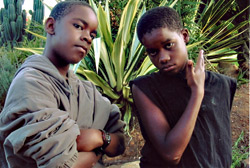There are at least two or three good documentaries struggling to get out of this one—much as its subjects, a half-dozen Baltimore kids sent for schooling in Kenya, deserve to escape their impoverished hood. Alas, it’s all a matter of resources. Filmmakers Heidi Ewing and Rachel Grady had a good idea: Follow the boys—most aged 12, about four of whom we get to know well—from hardscrabble homes through two years of scholarship study at the Baraka School to see how they develop, kind of like the 7 Up movies by Michael Apted. But their project is curtailed not just by politics (the 2002 hotel bombing in Mombasa) but by perspective. They don’t tell us a thing about the school—who funds it?—and provide zero background on why Baltimore public schools suck so bad. (But then, sadly, the reasons aren’t hard to guess.) Is the seven-year-old Baraka School, where all-white counselors tell the hotheads to “Chill out, dude,” some kind of front for vouchers, a hippie experiment, or what?
And while we learn a little something about the boys’ broken families, their educators never speak at length, nor do the Kenyans who eyeball the place rather suspiciously. When a well-meaning dude—I mean teacher—asks the kids if they identify with East Africans who are also “black and poor,” they all shake their heads at such reductivism. They feel American, not African-American; they miss pop and candy and Game Boys.
There’s a horrible sense here, though not made explicit by the filmmakers or teachers, that the kids would be better off if they never went back to Baltimore. (Or at least not until they finished high school abroad.) Would it be ethical to outsource inner-city education to provide jobs for cheap, strict, and professional Third World teachers? All the kids appear to have learning disabilities (dyslexia, ADD, etc.); their old schools haven’t taught them a thing; they’re so rowdy and ill-socialized that the all-male, rule-bound Baraka program would need a decade—not just two years, let alone one—to turn their lives around. By the end, of course, the filmmakers have to provide us with just the tiniest glimmer of hope for at least one kid, now a teenager with an eye toward college. But mainly you’re left with the impression that ours is the dark continent.








